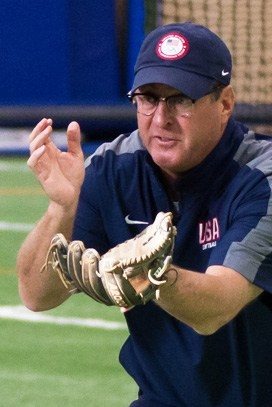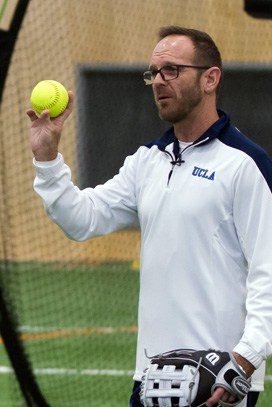- 307.5K Views
- 150 Followers
“Relationships-that’s what I have learned as the most important aspect in teaching lessons to young people. If you don’t establish some level of a relationship then all your lessons do not have an avenue for that lesson to travel.” This is what Coach Ken Eriksen has worked at as USF Softball continues to evolve into a program that competes for the College World Series championship every year.
Since Eriksen’s first year at the helm of USF’s most winning program, the Bulls have made 12 NCAA postseason appearances, two NCAA Super Regionals, a College World Series berth, won five conference titles (in three conferences: C-USA, BIG EAST, and The American), has produced over 850 wins and a numerous amount of All-Americans, Academic All-Americans, All-Conference players, and NCAA All-Region players.
In 2018, Eriksen starts his 22nd season as USF’s head coach and his 33rd overall with the softball program. As an outfielder/pitcher on the first USF baseball team to go the NCAA Tournament in 1982, Eriksen has been a winner since his arrival on campus in the fall of 1979. Eriksen was the first USF graduate to have participated in the NCAA Tournament as a player, as an assistant coach, and as a head coach, all at USF.
Eriksen began his love affair with USF over 35 years ago, when the freshman from Stony Brook, N.Y. (Ward Melville HS) first appeared in Tampa as a baseball student-athlete for USF baseball coach and Major League Hall of Famer Robin Roberts. It was under Roberts, assistant coaches Jeff Davis and Kevin Maronic that Eriksen learned the strategy and execution that involved high-level competitive ball. In four seasons as a player on the USF baseball team, and while playing five positions, his career batting average topped .315 and he had an ERA of 2.48 on the mound. In 1982, he was named to the NCAA All-Region tournament squad on a team that just came short of reaching the College World Series.
After earning his bachelor’s degree in Political Science (with an emphasis in Latin American Politics), Eriksen decided to turn his attention from the baseball diamond to the Fastpitch softball field all while starting his Masters Program in Public Administration at USF. He began playing the men’s game in 1985 at the local levels and began working his way up to eventually earning a roster spot on the nationally renowned Clearwater Bombers (1986-1992). He quickly established himself as a multiple position player. That enabled him to earn a spot on the 1991 U.S. Pan American Team that competed in Santiago de Cuba, winning a silver medal. In 1988, he was part of a U.S. Select Team that was the FIRST U.S. Team in 30 years that visited Communist-Russian occupied Cuba. A highlight for Eriksen was hearing the National Anthem played for the first time in 30 years on Communist Soil. In 1993, Eriksen began his tenure (1993-1995) with Larry Miller-Toyota Team out of Salt Lake City, Utah. In 1997, he officially retired after spending his last season with the Tampa Smokers, who won the ASA Men’s National Championship that year.
During his Fastpitch playing career, Eriksen amassed a wealth of national and international experience. He participated in eight International Softball Congress World Championships and eight ASA Men’s Major National Championships. In 1992, he was named First Team All-World as a catcher and to the All-North American Team. Eriksen also played in three USOC Olympic Sports Festivals (1993-1995), winning a silver medal in 1993.
After the 1996 season at USF, Eriksen was named as the second coach in USF Softball history. He was tremendously influential in the 1996 team’s run through a season that was capped off with its first-ever NCAA postseason appearance since its inaugural season of 1985. In his first year as head coach (1997), the Bulls shattered the offensive, defensive, and pitching records. The ’97 team gave USF its first 50-win season and won the ACC regular season championship for the second year in a row by finishing undefeated in conference (12-0). Eriksen guided the ’97 team to its best ever national ranking at No. 14 after finishing 50-13.
The 1998 season was one of the most successful seasons for the Bulls in their short history up to that point. They finished their second consecutive season with 50 plus wins (57-14) and won their third consecutive ACC Championship and automatic bid to the NCAA’s. Going into the postseason, USF was ranked sixth in the country, led by pitchers Monica Triner and Jennifer Thompson. Eriksen, who garnered the Southeast Region “Coach of The Year” nod, led USF to the finals of the NCAA Regional, hosted by USF, dropping the College World Series berth to Texas. Even though they did not make the College World Series, USF was still respected enough to finish eighth in the final NCAA softball poll.
The 2001 season was a story of the proverbial roller-coaster season. A tough schedule positioned this team to make a run at the NCAA Tuscaloosa, Ala., Regional. As the No. 5 seed in the tournament, the upstart Bulls knocked off No. 3 seed Oregon State in Game 1 to then face No. 2 seed Michigan. The Bulls eventually lost in 13 innings only to earn the right to face the No. 1 tournament seed and No. 4 nationally ranked Alabama Crimson Tide. In front of the home crowd, USF sent Alabama out of the tournament after a 4-2 win propelled the Bulls to the championship game against Michigan the next day. The Wolverines prevailed, 13-7, but the USF Softball team showed its patented tenaciousness in its run. The most memorable part of that tournament was Associate Athletic Director Lee Roy Selmon’s presence as USF’s representative. This proved valuable as Mr. Selmon began the process of funding a new stadium for USF. The plans were laid out in Tuscaloosa between games.
In 2003 and 2004, USF became one of the most feared teams in the country because of a tremendous pitching staff led by Leigh Ann Ellis (Barboursville, W. Va.). The Bulls went 54-19 and had their first 60-win season in 2004 with a 60-14 record. To say that softball became very competitive nationwide during this time would be an understatement. This began the time frame where TV fell in love with the game and this meant great coverage for teams like USF. In 2005, riding the wave of the last two years, USF made it to the NCAA postseason for the third consecutive year and made it to the finals of the NCAA Regional Tournament for the third time but came up short.
In 2006, the Bulls entered their first year with a new conference - the BIG EAST- and made an immediate impact, finishing second in the league with a record of 17-3. USF made history by making its fourth consecutive NCAA Regional appearance in Gainesville, Fla., (Florida, Florida Atlantic, North Carolina). USF finally prevailed, going 3-0 to win its first NCAA Regional Championship. The Bulls would then have to fly across the country to face No. 1 UCLA in Los Angeles. After two hard-fought games (0-2,1-3) UCLA went to the World Series, sending USF home after the Bulls made it again to the final game prior to Oklahoma City.
In 2008, Eriksen and his Bulls made their ninth appearance in the NCAA Tournament while claiming their first BIG EAST regular season championship.
After a few seasons where USF was bypassed on selection as an at-large choice for the NCAA tournament, Eriksen led the USF Softball program to an incredible “bounce-back” season. After multiple wins against top-ranked opponents throughout the year, the Bulls lost in the first round of the Big East Tournament. Because of their regular season strength, the Bulls earned an at-large bid to the NCAA Regional at Gainesville, Fla. (Florida, Florida Gulf Coast, Hampton). The Bulls went undefeated, beating Florida 1-0 in a packed house thriller. Sara Nevins pitched her way out of a bases loaded, no one out jam in the bottom of the sixth to propel the Bulls to their second NCAA Regional Championship. This time, the Bulls earned the right to host the NCAA Super Regional Championship at the year-old, state-of-the-art, USF Softball Stadium. After dropping the first game to Hofstra in extra innings the Bulls came back to win the last two games to launch USF’s first team sport program to play for its national championship at the College World Series. The Bulls eventually lost two hard fought games (Oklahoma 1-4) and LSU (0-1) to end their season ranked eighth and with their sixth 50-win season. The pitching staff ended the year ranked second in the country with a 1.23 ERA.
The Bulls followed up an exciting 2012 with a stellar 2013, winning their first-ever BIG EAST tournament championship hosted at USF. The Bulls put together their best record in conference play since joining the conference, going 18-3. With its 45 wins it was the 13th time in Eriksen’s career the Bulls had won at least 40 games. The Bulls made it once again to the finals of the NCAA Regionals in Gainesville, Fla., eventually dropping a heartbreaker, 2-0.
The 2014 season was the third consecutive NCAA Tournament run in three years for the Bulls. The Bulls participated in the American Conference for the first time and finished second. Once again, the Bulls made it to the finals of the NCAA Regionals again after playing extra- inning games in the first two tilts. The 2014 was USF’s third straight year with 40-plus victories. The 2014 senior class will be considered one of the most successful classes in USF Softball history.
After failing to get to the NCAA Tournament in 2015, the Bulls came back with a vengeance in 2016. During their American Conference regular season championship run, the Bulls set a USF school record with 23 straight wins. This propelled them into another successful postseason run that ended too short. The young Bulls were led by seniors Erica Nunn (All-American) and Lee Ann Spivey (career HR holder). The Bulls swept the American Conference Awards and broke many offensive records.
For Eriksen, his coaching at USF has coincided with his loyalty to Team USA National Teams. Eriksen was named head coach for the Men’s 19-and-under World Team for one year in 1997 to represent the United States in St John’s Newfoundland. In 2001, he was part of a coaching staff that developed players in the first year of the 2004 cycle leading up to the 2004 Olympic Games. He was the head coach of the Pan Am Qualifying Team that won gold in Maracay, Venezuela. He also was an assistant on a USA Team that represented the Nation in Canada. In 2002, he was named assistant coach with the United States Women’s National Team that won gold at the World Championships in Saskatoon, Canada. While still as an assistant coach under Mike Candrea in 2003, Eriksen was part of a staff that captured gold at the Pan Am Games in Santiago, The Dominican Republic.
Eriksen continued on as assistant coach with Team USA with the United States Olympic Team that won the gold medal at the Athens Olympics in 2004. Considered to be one of the greatest Olympic Teams ever put together, the 2004 team was inducted into the United States Olympic Hall of Fame in 2012. Still to this day, Eriksen is the only coach at USF to have ever won a gold medal at the Olympics.
In 2005, Eriksen took a leave of absence to help his wife Dr. Debra Eriksen (whom he met at USF) raise his two daughters (Tatiana 1996, and Natasha 2000). Eriksen returned to Team USA as an assistant coach in 2010 to help the Red, White, and Blue capture the World Championships in Caracas, Venezuela. Then, the next chapter began…softball and baseball were no longer on the Olympic menu. It would have to be reinstated at a later date.
In January of 2011, Eriksen was named the Head Coach of Team USA. The environment was different because all the players had retired after 2010. A new era had begun and it was the job of the United States Women’s National Team selection committee and the new staff of coaches to evaluate and pick players to establish a new core of National Team Players. In October of 2011, Eriksen led a group of 17 first-time National Team Members to gold at the Pan Am Games in Guadalajara, Mexico. In 2012, the same group lost in the gold medal game to Japan in extra innings (Whitehorse, Yukon Territory, Canada). As minor personnel changes continued to happen, Eriksen and the program persevered by constantly evaluating players in the United States.
In 2013, Team USA won the Pan Am Qualifier in Guaynabo, Puerto Rico. In 2014, in preparation for the World Championships in Amsterdam, Netherlands, Team USA captured the Italian Cup in Venice Italy by defeating Team Australia in the gold medal game. Once again with a pitching staff that did not have World Championship experience, the United States captured silver, dropping the gold medal game to Japan. With the youngest team amongst the world’s elites, Eriksen’s optimism did not waver. After a very successful 2015 season, the core group of the young Eagles had started to put years in the experience bank. Five years after getting the program with an empty roster, Team USA, with a mix of veterans and young talented players captured the gold medal once again in 2016. At the World Championship in Surrey, Canada, the USA went undefeated and beat Japan in the gold medal game to capture its first World Championship since 2010.
Eriksen continues to live in Tampa with his family. read more...
Since Eriksen’s first year at the helm of USF’s most winning program, the Bulls have made 12 NCAA postseason appearances, two NCAA Super Regionals, a College World Series berth, won five conference titles (in three conferences: C-USA, BIG EAST, and The American), has produced over 850 wins and a numerous amount of All-Americans, Academic All-Americans, All-Conference players, and NCAA All-Region players.
In 2018, Eriksen starts his 22nd season as USF’s head coach and his 33rd overall with the softball program. As an outfielder/pitcher on the first USF baseball team to go the NCAA Tournament in 1982, Eriksen has been a winner since his arrival on campus in the fall of 1979. Eriksen was the first USF graduate to have participated in the NCAA Tournament as a player, as an assistant coach, and as a head coach, all at USF.
Eriksen began his love affair with USF over 35 years ago, when the freshman from Stony Brook, N.Y. (Ward Melville HS) first appeared in Tampa as a baseball student-athlete for USF baseball coach and Major League Hall of Famer Robin Roberts. It was under Roberts, assistant coaches Jeff Davis and Kevin Maronic that Eriksen learned the strategy and execution that involved high-level competitive ball. In four seasons as a player on the USF baseball team, and while playing five positions, his career batting average topped .315 and he had an ERA of 2.48 on the mound. In 1982, he was named to the NCAA All-Region tournament squad on a team that just came short of reaching the College World Series.
After earning his bachelor’s degree in Political Science (with an emphasis in Latin American Politics), Eriksen decided to turn his attention from the baseball diamond to the Fastpitch softball field all while starting his Masters Program in Public Administration at USF. He began playing the men’s game in 1985 at the local levels and began working his way up to eventually earning a roster spot on the nationally renowned Clearwater Bombers (1986-1992). He quickly established himself as a multiple position player. That enabled him to earn a spot on the 1991 U.S. Pan American Team that competed in Santiago de Cuba, winning a silver medal. In 1988, he was part of a U.S. Select Team that was the FIRST U.S. Team in 30 years that visited Communist-Russian occupied Cuba. A highlight for Eriksen was hearing the National Anthem played for the first time in 30 years on Communist Soil. In 1993, Eriksen began his tenure (1993-1995) with Larry Miller-Toyota Team out of Salt Lake City, Utah. In 1997, he officially retired after spending his last season with the Tampa Smokers, who won the ASA Men’s National Championship that year.
During his Fastpitch playing career, Eriksen amassed a wealth of national and international experience. He participated in eight International Softball Congress World Championships and eight ASA Men’s Major National Championships. In 1992, he was named First Team All-World as a catcher and to the All-North American Team. Eriksen also played in three USOC Olympic Sports Festivals (1993-1995), winning a silver medal in 1993.
After the 1996 season at USF, Eriksen was named as the second coach in USF Softball history. He was tremendously influential in the 1996 team’s run through a season that was capped off with its first-ever NCAA postseason appearance since its inaugural season of 1985. In his first year as head coach (1997), the Bulls shattered the offensive, defensive, and pitching records. The ’97 team gave USF its first 50-win season and won the ACC regular season championship for the second year in a row by finishing undefeated in conference (12-0). Eriksen guided the ’97 team to its best ever national ranking at No. 14 after finishing 50-13.
The 1998 season was one of the most successful seasons for the Bulls in their short history up to that point. They finished their second consecutive season with 50 plus wins (57-14) and won their third consecutive ACC Championship and automatic bid to the NCAA’s. Going into the postseason, USF was ranked sixth in the country, led by pitchers Monica Triner and Jennifer Thompson. Eriksen, who garnered the Southeast Region “Coach of The Year” nod, led USF to the finals of the NCAA Regional, hosted by USF, dropping the College World Series berth to Texas. Even though they did not make the College World Series, USF was still respected enough to finish eighth in the final NCAA softball poll.
The 2001 season was a story of the proverbial roller-coaster season. A tough schedule positioned this team to make a run at the NCAA Tuscaloosa, Ala., Regional. As the No. 5 seed in the tournament, the upstart Bulls knocked off No. 3 seed Oregon State in Game 1 to then face No. 2 seed Michigan. The Bulls eventually lost in 13 innings only to earn the right to face the No. 1 tournament seed and No. 4 nationally ranked Alabama Crimson Tide. In front of the home crowd, USF sent Alabama out of the tournament after a 4-2 win propelled the Bulls to the championship game against Michigan the next day. The Wolverines prevailed, 13-7, but the USF Softball team showed its patented tenaciousness in its run. The most memorable part of that tournament was Associate Athletic Director Lee Roy Selmon’s presence as USF’s representative. This proved valuable as Mr. Selmon began the process of funding a new stadium for USF. The plans were laid out in Tuscaloosa between games.
In 2003 and 2004, USF became one of the most feared teams in the country because of a tremendous pitching staff led by Leigh Ann Ellis (Barboursville, W. Va.). The Bulls went 54-19 and had their first 60-win season in 2004 with a 60-14 record. To say that softball became very competitive nationwide during this time would be an understatement. This began the time frame where TV fell in love with the game and this meant great coverage for teams like USF. In 2005, riding the wave of the last two years, USF made it to the NCAA postseason for the third consecutive year and made it to the finals of the NCAA Regional Tournament for the third time but came up short.
In 2006, the Bulls entered their first year with a new conference - the BIG EAST- and made an immediate impact, finishing second in the league with a record of 17-3. USF made history by making its fourth consecutive NCAA Regional appearance in Gainesville, Fla., (Florida, Florida Atlantic, North Carolina). USF finally prevailed, going 3-0 to win its first NCAA Regional Championship. The Bulls would then have to fly across the country to face No. 1 UCLA in Los Angeles. After two hard-fought games (0-2,1-3) UCLA went to the World Series, sending USF home after the Bulls made it again to the final game prior to Oklahoma City.
In 2008, Eriksen and his Bulls made their ninth appearance in the NCAA Tournament while claiming their first BIG EAST regular season championship.
After a few seasons where USF was bypassed on selection as an at-large choice for the NCAA tournament, Eriksen led the USF Softball program to an incredible “bounce-back” season. After multiple wins against top-ranked opponents throughout the year, the Bulls lost in the first round of the Big East Tournament. Because of their regular season strength, the Bulls earned an at-large bid to the NCAA Regional at Gainesville, Fla. (Florida, Florida Gulf Coast, Hampton). The Bulls went undefeated, beating Florida 1-0 in a packed house thriller. Sara Nevins pitched her way out of a bases loaded, no one out jam in the bottom of the sixth to propel the Bulls to their second NCAA Regional Championship. This time, the Bulls earned the right to host the NCAA Super Regional Championship at the year-old, state-of-the-art, USF Softball Stadium. After dropping the first game to Hofstra in extra innings the Bulls came back to win the last two games to launch USF’s first team sport program to play for its national championship at the College World Series. The Bulls eventually lost two hard fought games (Oklahoma 1-4) and LSU (0-1) to end their season ranked eighth and with their sixth 50-win season. The pitching staff ended the year ranked second in the country with a 1.23 ERA.
The Bulls followed up an exciting 2012 with a stellar 2013, winning their first-ever BIG EAST tournament championship hosted at USF. The Bulls put together their best record in conference play since joining the conference, going 18-3. With its 45 wins it was the 13th time in Eriksen’s career the Bulls had won at least 40 games. The Bulls made it once again to the finals of the NCAA Regionals in Gainesville, Fla., eventually dropping a heartbreaker, 2-0.
The 2014 season was the third consecutive NCAA Tournament run in three years for the Bulls. The Bulls participated in the American Conference for the first time and finished second. Once again, the Bulls made it to the finals of the NCAA Regionals again after playing extra- inning games in the first two tilts. The 2014 was USF’s third straight year with 40-plus victories. The 2014 senior class will be considered one of the most successful classes in USF Softball history.
After failing to get to the NCAA Tournament in 2015, the Bulls came back with a vengeance in 2016. During their American Conference regular season championship run, the Bulls set a USF school record with 23 straight wins. This propelled them into another successful postseason run that ended too short. The young Bulls were led by seniors Erica Nunn (All-American) and Lee Ann Spivey (career HR holder). The Bulls swept the American Conference Awards and broke many offensive records.
For Eriksen, his coaching at USF has coincided with his loyalty to Team USA National Teams. Eriksen was named head coach for the Men’s 19-and-under World Team for one year in 1997 to represent the United States in St John’s Newfoundland. In 2001, he was part of a coaching staff that developed players in the first year of the 2004 cycle leading up to the 2004 Olympic Games. He was the head coach of the Pan Am Qualifying Team that won gold in Maracay, Venezuela. He also was an assistant on a USA Team that represented the Nation in Canada. In 2002, he was named assistant coach with the United States Women’s National Team that won gold at the World Championships in Saskatoon, Canada. While still as an assistant coach under Mike Candrea in 2003, Eriksen was part of a staff that captured gold at the Pan Am Games in Santiago, The Dominican Republic.
Eriksen continued on as assistant coach with Team USA with the United States Olympic Team that won the gold medal at the Athens Olympics in 2004. Considered to be one of the greatest Olympic Teams ever put together, the 2004 team was inducted into the United States Olympic Hall of Fame in 2012. Still to this day, Eriksen is the only coach at USF to have ever won a gold medal at the Olympics.
In 2005, Eriksen took a leave of absence to help his wife Dr. Debra Eriksen (whom he met at USF) raise his two daughters (Tatiana 1996, and Natasha 2000). Eriksen returned to Team USA as an assistant coach in 2010 to help the Red, White, and Blue capture the World Championships in Caracas, Venezuela. Then, the next chapter began…softball and baseball were no longer on the Olympic menu. It would have to be reinstated at a later date.
In January of 2011, Eriksen was named the Head Coach of Team USA. The environment was different because all the players had retired after 2010. A new era had begun and it was the job of the United States Women’s National Team selection committee and the new staff of coaches to evaluate and pick players to establish a new core of National Team Players. In October of 2011, Eriksen led a group of 17 first-time National Team Members to gold at the Pan Am Games in Guadalajara, Mexico. In 2012, the same group lost in the gold medal game to Japan in extra innings (Whitehorse, Yukon Territory, Canada). As minor personnel changes continued to happen, Eriksen and the program persevered by constantly evaluating players in the United States.
In 2013, Team USA won the Pan Am Qualifier in Guaynabo, Puerto Rico. In 2014, in preparation for the World Championships in Amsterdam, Netherlands, Team USA captured the Italian Cup in Venice Italy by defeating Team Australia in the gold medal game. Once again with a pitching staff that did not have World Championship experience, the United States captured silver, dropping the gold medal game to Japan. With the youngest team amongst the world’s elites, Eriksen’s optimism did not waver. After a very successful 2015 season, the core group of the young Eagles had started to put years in the experience bank. Five years after getting the program with an empty roster, Team USA, with a mix of veterans and young talented players captured the gold medal once again in 2016. At the World Championship in Surrey, Canada, the USA went undefeated and beat Japan in the gold medal game to capture its first World Championship since 2010.
Eriksen continues to live in Tampa with his family. read more...
-
December 01, 2021
Using connection points for better hitting
-
June 19, 2021
Hitting: Biggest fears of hitters and how to conquer them
-
December 30, 2020
Motivating your bottom 33% using the “sandwich” approach
-
December 28, 2020
Why it pays to be creative on defense
-
December 03, 2020
Offensive strategies based on the Williams College Study of Baserunning
-
December 02, 2020
The reasons for defensive coverage changes
-
November 27, 2020
Must-know information for planning an effective practice
-
June 30, 2020
The difference between the hit & run and the run & hit
-
June 22, 2020
How does a hitter create options?
-
February 27, 2020
The coaching journey
-
February 27, 2020
Encourage athletes to put down the cell phone
-
February 27, 2020
How to avoid over coaching














